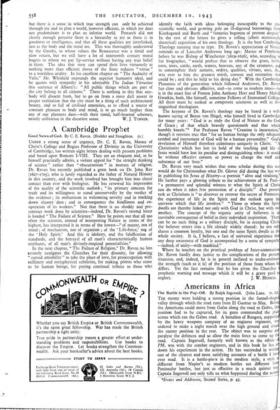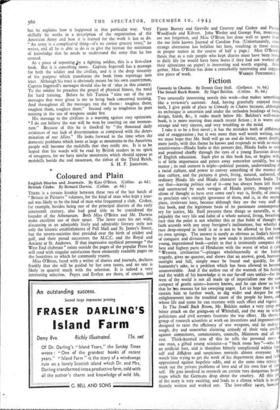Americans in Africa
The Battle is the Pay-Off. By Ralph Ingersoll. (John Lane. 7s. 6c1 Tim enemy -were holding a strong position in the funnel-shape valley through which the road runs from El Guettar to Sfax. Befor the Americans could move from Gafsa along the road to Gabes, thi- position bad to be captured, for its guns commanded the pl across which ran the Gabes road. A battalion of Rangers, support by the heavy weapons company of an engineer regiment, ordered to make a night march over the high ground and attac the enemy position in the rear. The object was to surprise an paralyse the defences and so allow the main force to come up th road. Captain Ingersoll, formerly well known as the editor PM, was with the combat engineers, and in this book he has se down his experiences in the action. He has succeeded in writin one of the clearest and most satisfying accounts of a battle I has' ever read. It is a battle-piece in the modem style a style different from Napier's as modem battles are different f Peninsular battles, but just as effective in a much quieter wa Captain Ingersoll not only tells us what happened during the actto *Essays and Addresses, Second Series, p. 45.
but he explains how it happened in that particular way. Very skilfully he works in a description of the organisation of the American Army and how it is trained for the work it has to do. "An army is a complicaml thing—it's no corner grocery store," he writes, and all he is able to do is to give the layman the minimum of knowledge that he needs to understand the army that he has created.
As a piece of reporting iy a fighting soldier, this is a first-class book. But it is something more. Captain Ingersoll has a message for both the soldier and the civilian and it is the deep sincerity of his purpose which transforms the book from reportage into tract. Although his tract is obviously meant for his own countrymen, Captain Ingersoll's messages should also be of -alue in this country. To the soldier he preaches the gospel of physical fitness, the need for hard training. Before he left Tunisia "nine out of the ten messages that were given to me to bring back concerned training. And throughout all the messages ran the theme : toughen them, toughen them, toughen them." Second only to toughness he puts training in the use of weapons under fire. His message to the civilians is a warning against easy optimism. "I do not believe the war will be won by coasting on our momen- tum." Because of this he is shocked by "the thousand daily evidences of our lack of determination as compared with the deter- mination of our Allies." He looks forward to the time when the domestic problems which loom as large as mountains to the American people will become the molehills that they really are. It is to be hoped that his words will be read by British readers in no spirit of smugness, for we have similar mountains which should appear as molehills beside the real mountain, the defeat of the Third Reich.
S. H. F. JOHNSTON.



























 Previous page
Previous page